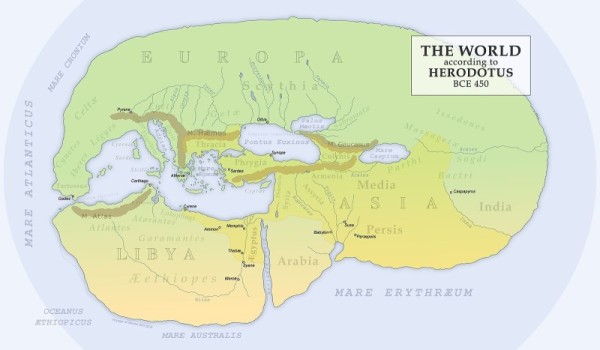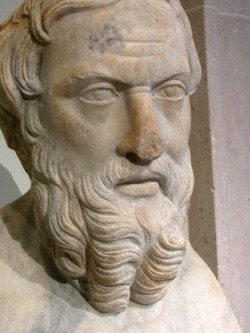Thus said Darius and hastened on his march forwards.

Translated by George C. Macaulay — our special project presenting the complete Herodotus with URLs for all of those people, places, events, and things which baffles and discourages modern readers.
Previously on Herodotus
97. These, I say, having such manners as I have said, were subdued by the Persians and accompanied the rest of the army: and when Darius and with him the land-army arrived at the Ister, then after all had passed over, Darius commanded the Ionians to break up the floating bridge and to accompany him by land, as well as the rest of the troops which were in the ships: and when the Ionians were just about to break it up and to do that which he commanded, Coës the son of Erxander, who was commander of the Mytilenians, said thus to Darius, having first inquired whether he was disposed to listen to an opinion from one who desired to declare it:
O king, seeing that thou art about to march upon a land where no cultivated ground will be seen nor any inhabited town, do thou therefore let this bridge remain where it is, leaving to guard it those same men who constructed it. Then, if we find the Scythians and fare as we desire, we have a way of return; and also even if we shall not be able to find them, at least our way of return is secured: for that we should be worsted by the Scythians in fight I never feared yet, but rather that we might not be able to find them, and might suffer some disaster in wandering about. Perhaps some one will say that in speaking thus I am speaking for my own advantage, in order that I may remain behind; but in truth I am bringing forward, O king, the opinion which I found best for thee, and I myself will accompany thee and not be left behind.
With this opinion Darius was very greatly pleased and made answer to him in these words: “Friend from Lesbos, when I have returned safe to my house, be sure that thou appear before me, in order that I may requite thee with good deeds for good counsel.”
98. Having thus said and having tied sixty knots in a thong, he called the despots of the Ionians to speak with him and said as follows:
Men of Ionia, know that I have given up the opinion which I formerly declared with regard to the bridge; and do ye keep this thong and do as I shall say: —-so soon as ye shall have seen me go forward against the Scythians, from that time begin, and untie a knot on each day: and if within this time I am not here, and ye find that the days marked by the knots have passed by, then sail away to your own lands. Till then, since our resolve has thus been changed, guard the floating bridge, showing all diligence to keep it safe and to guard it. And thus acting, ye will do for me a very acceptable service.
Thus said Darius and hastened on his march forwards.

CC BY-SA 2.0 image from Wikipedia.
99. Now in front of Scythia in the direction towards the sea lies Thrace; and where a bay is formed in this land, there begins Scythia, into which the Ister flows out, the mouth of the river being turned towards the South-East Wind. Beginning at the Ister then I am about to describe the coast land of the true Scythia, with regard to measurement. At once from the Ister begins this original land of Scythia, and it lies towards the midday and the South Wind, extending as far as the city called Carkinitis. After this the part which lies on the coast of the same sea still, a country which is mountainous and runs out in the direction of the Pontus, is occupied by the Tauric race, as far as the peninsula which is called the Rugged Chersonese; and this extends to the sea which lies towards the East Wind: for two sides of the Scythian boundaries lie along by the sea, one by the sea on the South, and the other by that on the East, just as it is with Attica: and in truth the Tauroi occupy a part of Scythia which has much resemblance to Attica; it is as if in Attica another race and not the Athenians occupied the hill region of Sunion, supposing it to project more at the point into the sea, that region namely which is cut off by a line from Thoricos to Anaphlystos. Such I say, if we may be allowed to compare small things such as this with great, is the form of the Tauric land. For him however who has not sailed along this part of the coast of Attica I will make it clear by another comparison: — it is as if in Iapygia another race and not the Iapygians had cut off for themselves and were holding that extremity of the land which is bounded by a line beginning at the harbour of Brentesion and running to Taras. And in mentioning these two similar cases I am suggesting many other things also to which the Tauric land has resemblance.[1]
100. After the Tauric land immediately come Scythians again, occupying the parts above the Tauroi and the coasts of the Eastern sea, that is to say the parts to the West of the Kimmerian Bosphorus and of the Maiotian lake, as far as the river Tanaïs, which runs into the corner of this lake. In the upper parts which tend inland Scythia is bounded (as we know) by the Agathyrsians first, beginning from the Ister, and then by the Neuroi, afterwards by the Androphagoi, and lastly by the Melanchlainoi.[2]
– Herodotus, Book IV
Notes
1. Herodotus is describing modern Crimea in verse 99. Carkinitis was an ancient city in Crimea. “Tauric race” and so on refers to the ancient peoples who inhabited that region. Herodotus compares the geography and inhabitants to the Athens and its environs (“Attica”).
2. Peoples who dwelt in the interior regions north and northeast of the Black and Azov Seas. Next week Herodotus discusses these peoples in detail.
| <—Previous | Master List | Next—> |
Herodotus made his living by being interesting. In a world where most people did not read and could not afford to buy a book even if they could, they would pay to listen to Herodotus recite from his books. They would not pay to be bored. In that world, the names that populate his stories would have some general familiarity to his audience. Their obscurity to us is a barrier that this series seeks to break down.
MORE INFORMATION
MAP LIBRARY
Because of lack of detail in maps as embedded images, we are providing links instead, enabling readers to view them full screen.

Leave a Reply
You must be logged in to post a comment.